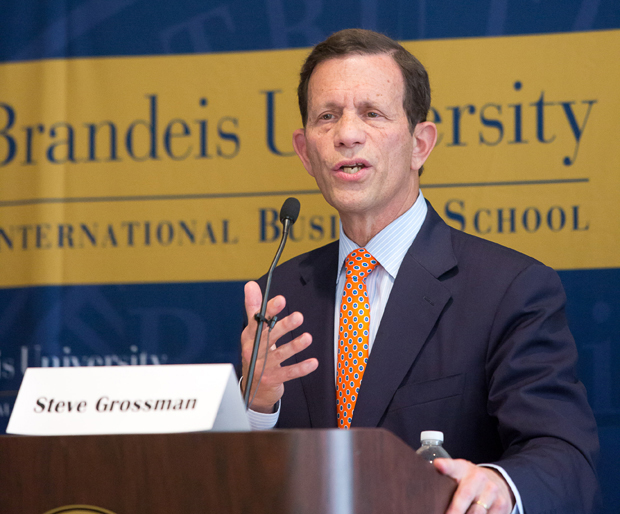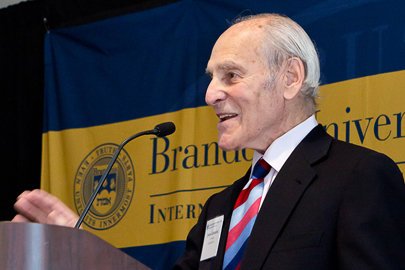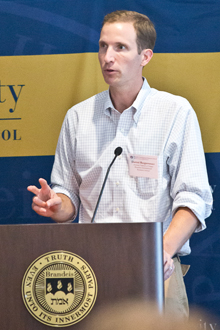Muni finance conference focuses on infrastructure
These expenditures pay off for public in many ways, experts say

State Treasurer Steven Grossman said Massachusetts job growth is strong, but talent shortage is serious.

Keynote speaker Jim Lebenthal said infrastructure spending benefits all.

Associate Prof. Daniel Bergstresser helped conceptualize the conference.
The importance of municipal markets for financing roads, schools, public works and more was a major theme of a conference at Brandeis International Business School that brought more than 200 academics and practitioners to campus Aug. 3.
The event presented an opportunity to discuss the evolution of public finance and explore research on recent developments in municipal credit markets, which have seen extreme volatility and rapid change over the past few years.
“Infrastructure is that untrumpeted, unappreciated word that sticks to the roof of the mouth like peanut butter on white bread,” municipal bond entrepreneur Jim Lebenthal told the attendees in his keynote address to the Municipal Finance Conference. “Infrastructure is not 'spending.' It's money that comes back to the public in many forms – the mass transit that gets us to work, the purified water that we drink. It's not just for the one percent or the 99 percent, but for everybody.”
The conference, which was funded by the Rosenberg Institute of Global Finance at the business school and a number of corporate sponsors, featured more than 30 speakers, including Lebenthal, Massachusetts State Treasurer Steven Grossman, professors from MIT and Babson College and representatives from the Federal Reserve and a variety of investment and financial management firms.
“Municipal markets are vital for so many things that we take for granted, from the streets we drive on to the academic institutions in which we teach and study,” said business school Associate Professor Daniel Bergstresser, who conceived of the conference with Richard Ryffel, former managing director at Edward Jones. “The unique thing about this event is the cross-fertilization in bringing together groups of people who have traditionally discussed these issues separately.”
Grossman spoke about significant strides that Massachusetts has taken in the last 18 months with respect to building its economy. He outlined the importance of “ideas, money and talent,” and said that it is on that last measure that the state still has room to improve.
“In a year in which there was very little growth across the country, we grew this economy by more than 40,000 jobs,” he said, “but we still have a talent challenge, and that is the thing that keeps me awake at night.”
Babson professor Erik Sirri offered some initial findings from his highly-anticipated new study on how regulatory efforts to improve transparency have affected municipal-bond trading. "It's pretty clear that trading costs fell when transparency came to the bond markets," Sirri said at the event. "There is every evidence that transparency is beneficial to trading in this market."
The wide range of subjects discussed during the conference also included liquidity in municipal bond markets, the relationship between disclosure and market efficiency and similarities in credit climates in California and Greece.
“We wanted to take a broad approach that allowed for a lot of different perspectives and topics,” said Bergstresser. “This is a conference that we hope will be the start to conversations rather than the end of them.”
The International Business School website has more information about the event, including a complete list of speakers and the schedule of sessions. The event was sponsored by The Bond Buyer, Cornerstone Research, Mergent, Diver by Lumesis, Edward Jones, Janney Capital Markets, JANYS Analytics, Loop Capital, the Municipal Finance Journal and Webster University.
Categories: Business





